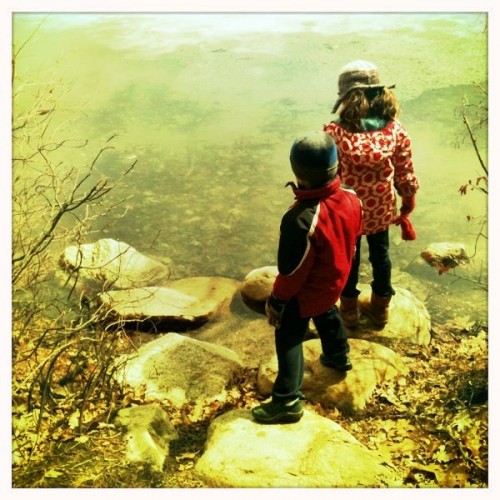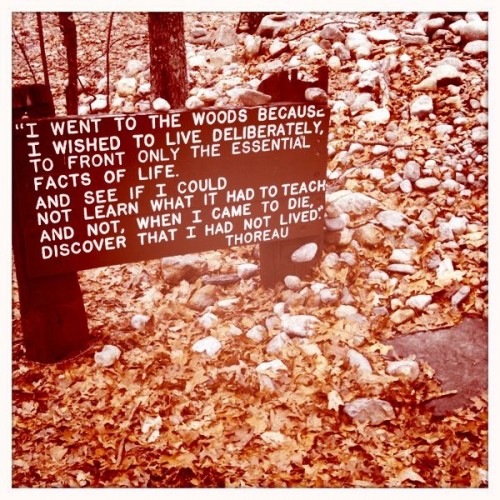
"I never had to choose a subject -- my subject rather chose me." -Ernest Hemingway
There is a sprawling tree outside of my office window. The tree's slow movement through the four seasons accompanies me steadfastly every single day. The other morning when I looked out, the tips of its winter-black branches were just beginning to fill out, almost imperceptibly puffy, and I knew that meant nascent blooms, the promise of spring. It was March and I was writing about a day earlier that week, during spring break, when on a whim, I'd taken my two children to Walden Pond. In the chilly morning, the path still crusted with dirty snow, we'd slowly circled the pond, stopping to look at the spot where Thoreau's house had been, talking about living in a cabin for a whole year, looking for signs of spring. We peered at the branches, which were mostly free now of snow, and searched for the narrow, bright-green shoots that push through the ground in advance of the first crocuses. Grace and Whit were quiet, almost reverent in their observations of this natural place. They received, somehow, the palpable peace of Walden.
So now here I was, writing about that day. I scrolled through a few pictures I'd taken with my iPhone: the kids standing among the pile of rocks that marks the spot where Thoreau's cabin stood; the back of Whit's head as he gazed out at the still frozen-over pond; Grace's red nose, up close, her head tipped back to look up at the trees. I wrote about what I observed in my children and about what I personally felt as we circled the snowy pond -- articulating my observation of their reactions, what I told myself they meant and my own emotional response to being at Walden together. "I want to fill them up with poetry," I concluded, and as the words flew from my fingers to the page, I sat back and exhaled. Yes. That's what I had wanted to do that day: Fill them with wonder for the small things in the world, and with admiration for all beauty in all forms. I sat back in my chair, gazing out at the familiar net of black branches against a steel-gray sky. That's what I want to do every day.
This is often how it happens. Propelled by some instinct I can neither fully understand nor articulate, I sit down and write about the experience. As I pull it back out from memory and turn it over in the light of my thoughts, words and sentences plumb what I learned or felt in the moment. I find myself writing about the most mundane moments, experiences I might have glossed over in the past. As I've dug deeper into my own life and begun writing about it, the scenes and memories that have yielded the richest insights are often ones that I would never have identified as particularly noteworthy if I had just lived them. The grout between the tiles of life's big moments, you might say: An ordinary, gray Tuesday morning in March at Walden Pond.
Though I had always written -- poems, stories, journals -- as a child and young adult, a nascent career in business focused me elsewhere. During my twenties, I wrote horizontally. I created endless PowerPoint presentations, but never returned to the orientation I knew so well: writing narrative. I lost touch with my writer self.
In my late twenties, everything began to change. I had two children, an episode of deep postpartum depression and a spiritual crisis of sorts. I found myself drawn back to the page, to the screen, initially, at least consciously, to keep track of all the little moments that I knew I'd forget. My children changed so fast I could hear time whistle as it flew past me, and I was desperate to remember the small details. In the process of writing them down, I realized that other, subconscious instincts had propelled me to the page: in the act of recording small memories, I unearthed the meaning of these small fragments of my life. My writing actually excavated, polished, enhanced my understanding of my life. It was as though I was putting a small geode on the paper and then, by continuing to write, turning it over and over, awed by the nuances of its sparkle.
I wrote about Whit's first ride on the subway one winter day, and about how the jerk of the train starting had thrown him tumbling halfway down the car, laughing in his snowsuit. I wrote about Grace's fourth birthday, and the thrill of spending it in Manhattan, and blowing out candles on pastel-frosted cupcakes in a hotel room with her godmother. I wrote about the Halloween costumes they wore one year, when Grace was a white-feathered chicken and Whit was a cracked egg, and about the constant jokes I'd gotten while trick-or-treating that I was "really taking a stand on which came first!" I wrote about taking them to visit one of my favorite spots, a round tower at the back of the beautifully-landscaped Mount Auburn cemetery, and of the way their voices grew hushed, their eyes wide, when they encountered the tangible magic at the small stream in the grass at the base of the tower where, people whisper, fairies live. And I acknowledged that the wound from my post-partum depression would be slow to heal, leaving guilt in its wake.
My subject, it seemed, had chosen me. It's not precisely, nor simply, that my subject is motherhood. It's more that motherhood, for me, washed in on a wave of complicated emotions fraught with both ambivalence and power. This wave pushed me back to writing as I tried to parse what I was feeling and thinking, tried to make sense of a role which was proving more difficult and less instinctive than I'd ever imagined. As I continued writing about my children, describing them as they were as babies and toddlers, trying to preserve those versions of them like insects in amber, I found myself exploring other corners of the complicated, fecund terrain of motherhood. Writing is where I first confessed the guilt from my post-partum depression. I acknowledged how deep a wound motherhood had gouged into me, how profoundly my depression and inability to immediately embrace my infant had altered my sense of myself. In writing about it, it became clear this wound was still healing. I circled around a small set of topics, and these emerged as themes in my life.
Grace and Whit drew my attention to time's swift passage in a newly visceral way. For years, I was in a rush to get to the next thing, but suddenly, there was no next thing. As I watched my babies grow into toddlers and then children, I experienced moments swollen with a fullness I'd never known before, but accompanied with the steady drumbeat of time passing. My son and daughter brought with them noise and sleeplessness and worry and chest-tightening love and, perhaps most of all, the sharp awareness of the fleetingness of it all. They brought stuffed animals and soccer balls and exercise pants and Harry Potter and sleepy whispers of love and a handful of dandelions offered with grubby hands and proud eyes. They brought my attention to my life, to a thousand million tiny moments, some of which glitter brilliantly, most of which blend into the slurry of memory. My children showed me that there is so much about this world, and about myself, that I only understand by writing it all down.
This post originally appeared on Literary Mama. Read more of Lindsey's work at her blog, A Design So Vast, and on Twitter and Facebook.
